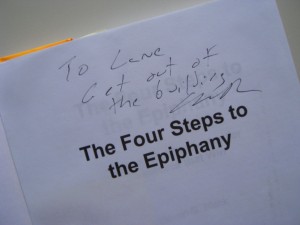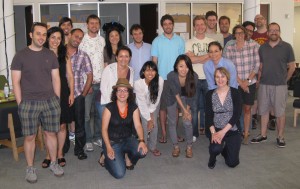“Customer Development is the process of how you get out of the building and search for the model. Customer Development is designed so that you the founder(s) gather first hand experience about customer and market needs.” – SteveBlank.com, 5/13/2010
 I heard Steve Blank speak at the Los Angeles Lean Startup Circle 10/6 at UCLA. He even signed my book! “To Lane, Get out of the building”
I heard Steve Blank speak at the Los Angeles Lean Startup Circle 10/6 at UCLA. He even signed my book! “To Lane, Get out of the building”
I can’t find the specific deck he used, most of the content is covered by these decks on SlideShare:
- Customer Development Update (Different flavors of custdev for different types of startups)
- Testing your value proposition with an MVP (The CarrotBot story is a great example of how a business model canvas evolves as you find product market fit)
A video stream of the event is archived on LiveStream.
When I first read “The Four Steps to the Epiphany” I was frustrated that Steve advised people to “get out of the building” but didn’t provide any advice about what to do when you’re out there. As a UX practitioner, I know how to help teams achieve meaningful conversations with users, synthesize the information we collect and make it actionable. I wondered how he could have missed the fact that UX folks had been focused on this stuff for YEARS.
After hearing him tell the CarrotBot story, I realized that Steve is giving advice at a fundamental/basic level. He’s working with CS students who love tech and, left to their own devices, would prefer to just start building things. They think they already know. His demand that they “get out of the building” helps them see the world in a new way. It doesn’t take a lot of fieldwork for his students to learn what’s really going on and look at the problem differently.
The edict “get out of the building” is a general, simple thing anyone can do. Any entrepreneur is going to learn by trial and error anyhow and they are going to learn a lot more, a lot faster if they are in the world. Making it a process could create another device that entrepreneurs can use to avoid talking to real people.
I think UX people harm ourselves by calling what we do “user research” and “testing.” We do that, but there’s also aspects of the work that are deeper and more subtle. We’re trying to learn about people and their problems so we can create the right solutions. This is the critical learning for entrepreneurs who are looking for a viable product idea. Once someone starts to get out there, they develop second-order problems, like “how do we do this as a team?” and “what do we do with all this information we’ve collected?” and “what about all this contradictory information?” That’s when people are ready to use some tools and tricks.
The other highlight of the talk was Steve’s description of how the business model canvas is used to define the hypothesis of your business. You get out of the building to discover if your hypothesis are true, and you Pivot when one or more aspects of your business model canvas changes.
Thanks, Steve for an excellent talk, I enjoyed meeting you!
